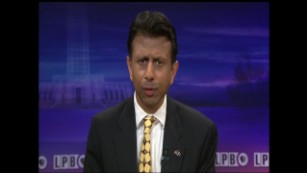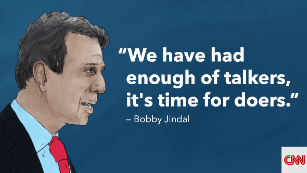Bobby Jindal faces an uphill fight in the crowded 2016 field
Updated 6:40 PM ET, Wed June 24, 2015, | Video Source: CNN, Source
Washington (CNN) Louisiana Gov. Bobby Jindal, once a Republican rising star who passed on an opportunity to seek the White House in 2012, announced his candidacy on Wednesday under much more trying circumstances.
Jindal announced his bid over social media, just hours before hosting a kickoff rally.
"I'm running for President of the United States of America. Join me," Jindal tweeted, with a link to his website's announcement page.
At his rally in Kenner, Louisiana, Jindal sought to promote himself as a bold leader who not only talked the talk but walked the walk as governor of Louisiana.
"The big government crowd -- they hate what I have done," Jindal said to the crowd of about 500. "I am guilty as charged, and our state is better off for it today. We have had enough of talkers, it's time for doers. I'm not running for president to be somebody, I'm running for president to do something."
But if he wants to compete in the expansive Republican field, he'll have to resurrect a reputation that has fallen significantly in recent years. Jindal is now polling toward the bottom of the field, registering at just 1% in the latest CNN/ORC poll.
Jindal's popularity in his own state has suffered -- a recent poll has his approval at 32% -- thanks to budget troubles and perhaps a preoccupation with playing to a national audience. His refusal to raise taxes to help balance the state's books has resulted in deep cuts to popular programs and areas of government spending such as health care and education.
His wife introduced him on stage, the only speaker before he took to the podium. The roll out also featured a couple of biographical videos.

Jindal, the country's first Indian-American governor, is likely best-known nationally for his flip-flop on Common Core educational standards -- from support to opposition, a move many saw as opportunistic as he marches toward a presidential bid.
In 2010, his state implemented the standards. By 2014, he was blasting them. In the interim, many conservatives fearful of government takeover of schools had begun to protest the standards across the country, pushing Republican politicians to rethink their support.
Jindal's reversal marked a watershed moment for the politician, who following Romney's 2012 loss, pushed for the GOP to represent something other than being the "party of no."
The Brown University graduate and Rhodes scholar went even further, chastising his peers for verbal gaffes and unforced errors when politicking leading up to the presidential election.
"It's not going to be the last time anyone says something stupid within our party, but it can't be tolerated within our party," he said. "We've also had enough of this dumbed-down conservatism. We need to stop being simplistic, we need to trust the intelligence of the American people and we need to stop insulting the intelligence of the voters."
But his flip on Common Core marked Jindal as a man willing to play to his base -- similar to those pols he had condemned in 2012.
America may also recall the 44-year-old for his Republican response to Obama's first joint address to Congress in 2009 -- a performance most remembered for Jindal's awkward delivery than anything else.
Though initial polling shows Jindal is a longshot, he has carved out a niche of vibrant support among evangelical Christians and the anti-Common Core activists.
He's also positioned himself as a top opponent of "political correctness" and has at times led his party's charge in railing against radical Islam, while also straying into the controversial territory.
In an hour-long briefing with reporters Wednesday in New Orleans, Jindal's soon-to-be presidential campaign advisers stressed that the Louisiana governor will highlight his record as an executive as he focuses on an early state strategy.
"We're going to hunt where the ducks are," said chief strategist Curt Anderson, a Jindal adviser since 2003 and former Republican National Committee political director.
Jindal's four main objectives as president would be securing the border, replacing Obamacare, growing the private sector and increasing defense, his aides said. He will also be "aggressive" on calling for the destruction of radical Islam and that containment is a strategy for losers.
The Louisiana governor will likely fight for space on the right of the so-far 13 person GOP field, alongside Texas Sen. Ted Cruz, former Arkansas Gov. Mike Huckabee, neurosurgeon Ben Carson and former Pennsylvania Sen. Rick Santorum.
Aides argue that Jindal hasn't been on the trail like other candidates, so naturally his name recognition will be low.
"Half these people don't know who their own damn governor is, let alone the governor of Louisiana," Anderson said, referring to voters nationwide who aren't plugged into presidential politics as much as reporters and operatives.
Jindal was a political wunderkind when he first burst onto the scene helping shape health care policy. In 1996, at the age of just 24, Jindal was appointed as head of Louisiana's department of health policies.
Later, he served under President George W. Bush in the Department of Health and Human Services as a top adviser to then-HHS Secretary Tommy Thompson.
Raised in a Hindu household, Jindal converted to Catholicism in high school.
He first cut his own political teeth in 2003, surprising many to force a run-off election in the Louisiana gubernatorial race. Though he lost, he set himself up for a successful congressional run in 2004, serving until finally winning the governor's mansion in 2008.
Jindal's first stop after his speech Wednesday night will be New Hampshire on Thursday, followed by Iowa on Friday. He holds a fundraising event in Baton Rouge on Saturday — the only fundraising event that will appear on their financial reports for the period that ends on June 30, they say.


